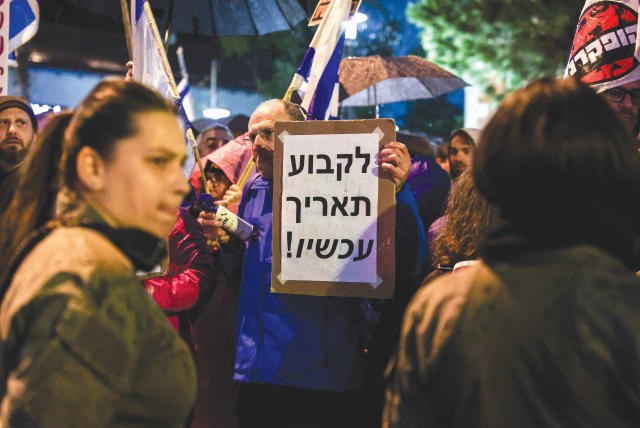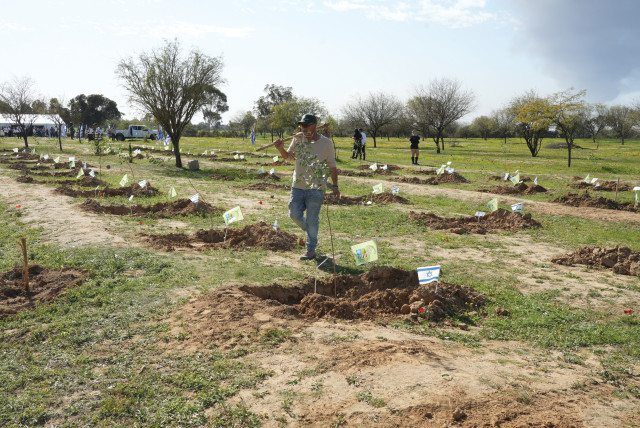Is it legitimate to resume anti-government protests during the war? - opinion

The place of protests against the government is becoming more and more legitimate with every day that goes by.
For 39 consecutive weeks, hundreds of thousands of citizens across Israel carried a flag in one hand, and a protest sign in the other, and set out to fight for the democratic character of the country. On the morning of the 40th Saturday, since the judicial reform protests began, Israel suffered one of its darkest days ever.
On this day, hundreds of thousands of citizens, including myself, set out to fight for the existence of the country. During the past four months, Israel has been in battle both in the South and North, with no clear end in sight.
Lately, there have been calls to renew the protests against the government, although regarding different issues than the previous protests, and to fight for issues that are occurring outside the battlefield. So a significant dilemma arises: In these tough times of war – when many reservists are still on duty, and hostages are still in captivity – is it legitimate to resume the protests against the government?
AS A RESERVIST, fighting shoulder to shoulder with people who have different political views, and as one who believes in the strength of Israeli democracy, the answer is clear: the protests are legitimate. The current state of the war, the uncertainty concerning the “day after,” and the citizens’ desire to take responsibility, amplifies the legitimacy of such protests over time.
The beginning of a war demands us to unite, stop our daily routines, put controversies aside, and invest all available resources in order to support the army, the civilians, and the war effort. In the first months, we were still in shock, and demonstrations against the government and its activities were seen as illegitimate.
However, as time passes, and as the war situation stabilizes, and the end is not in sight, the place for public criticism begins to grow.
IDF operated widely and intensively
The IDF operated widely and intensively, with active involvement of hundreds of thousands of reservists. But now the situation is different. Many reservists are no longer fighting in Gaza, and it seems that over time, fewer people are involved in the operational side.
The reluctance of the government to deal with the “day after,” and its unwillingness to present to the public a clear plan (especially when many citizens fear that this approach is motivated by personal and political issues), arouses the desire to act and influence both the current situation and the near future. This uncertainty strengthens the legitimacy to criticize and protest against the government’s activities.
People holding the opposing view will certainly claim that such protests will harm and interfere with the functioning of the government and its ability to manage the war efforts. Protests are intended to shock, disturb, and influence. Therefore, a broad protest activity may divert the government’s attention from the efficient control of the war.
Naturally, demonstrations raise controversial issues. Bringing the disputes about these issues back to the public discourse might damage the unity that has been created in the nation since the beginning of this war.
Yet, we can’t deny the situation that existed before October 7. The level of controversy and polarization in the Israeli public was probably at the highest peak our country has ever known. The war didn’t cause these controversial issues to disappear – it only postponed the daily discussion regarding them. It is natural, that as time goes by, and the war events become more contained, and in a sense, become part of the country’s routine, these controversies rise again and require the public’s attention.
BUT WHAT about the soldiers in the battlefield? Don’t we need to leave all the disputes aside until their return? It is possible that bringing protests into the public discourse today, with the war ongoing, may affect their functioning and unity.
My personal experience shows otherwise. My platoon, during our joint reserve service during the war, managed to set aside political differences in order to avoid inflaming the situation. That’s why I’m confident that the soldiers on the front will be able to maintain their unity and coherence in order to keep fighting at the highest level possible, due to their mutual values and beliefs as Israeli citizens who fight for the country’s security – even if protests arise.
Protests do not arise in comfortable situations, but rather when a group of people feel that the current situation is not desirable and must be changed.
The resumption of the protests is a testimony to the resilience of democracy. In times of uncertainty, difficulty, and loss, it is the right of the people to hold those in power accountable, demand transparency, and strive for a better tomorrow.
Therefore, the place of protests against the government is becoming more and more legitimate with every day that goes by.
The writer is a third-year student pursuing a dual degree in computer science and entrepreneurship at Reichman University. With a distinguished military background as a combat officer, he now continues to serve as a reservist at the rank of captain. Currently, he is a fellow of the Argov Fellowship in Leadership and Diplomacy.
Jerusalem Post Store
`; document.getElementById("linkPremium").innerHTML = cont; var divWithLink = document.getElementById("premium-link"); if (divWithLink !== null && divWithLink !== 'undefined') { divWithLink.style.border = "solid 1px #cb0f3e"; divWithLink.style.textAlign = "center"; divWithLink.style.marginBottom = "15px"; divWithLink.style.marginTop = "15px"; divWithLink.style.width = "100%"; divWithLink.style.backgroundColor = "#122952"; divWithLink.style.color = "#ffffff"; divWithLink.style.lineHeight = "1.5"; } } (function (v, i) { });

